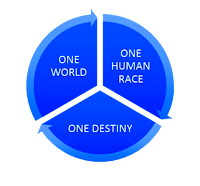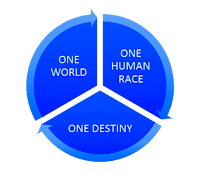LOVE MAKING THE WORLD GOES ROUND?
|
A
|
s I see it, love is really what makes the world goes round;
probably more so than, as the old saying goes, money.
|
F
|
or the enquiring person, as soon as the term 'love' is mentions,
the mind will automatically ask: 'what kind of love is being referred to?' And so it requires me to provide some clarification about the
kinds of love there are and the one, if I am being specific, I have in mind.
|
N
|
ormally, it seems to me, when people speak of 'love', they are
referring to the intense, extensive and consuming mutual feelings that two
individuals can or have for each other. Feelings which gives them a sense of
warmth, glow and radiate pleasure through their bodies when they think of,
speak of, tough and hug each other. A sense of joy, of pride and an enduring
feeling of wholesomeness about being 'loved' by their love and of 'loving'
their love.
|
N
|
ow, of course it is the case that all love relationships will not
be equally intense, enduring and mutually reciprocative as all the others.
There can be situational factors involved, which place restraints on how people
perceive, express and give effect to their 'love for each other.' These factors
can be personal, psychological, physical, cultural, religious, and social.
Love between two individuals is, I would argue, more of a social
phenomenon, which is being evolved into a personal one.
|
T
|
his, it seems to me, has everything or nearly everything to do
with the fact that the traditional or orthodox relationship between a man and a
woman, was predicated on the need for people to have children and ensure the
survival of the tribe and human specie. The concept of 'love', or 'being in
love', is something which has evolved and is continuing to evolve along the
way. In this context, however, we can see 'love' continuing to function
in its procreative role of ensuring the survival of the human specie.
|
I
|
n contemporary societies, love or being in love does not of
itself, any longer suggest that the individuals are contemplating having
children, although this is the most likely outcome in the majority of cases.
This is even more so when we take into consideration lovers of the same gender.
|
T
|
he campaign for equal rights for LGBT people, I would argue, has
resulted in fundamental shifts in societal perceptions, and an evolution in our
thinking about people with what was hitherto seen non-orthodox sexual
orientations, even though these orientations have been around probably from
time immoral.
|
T
|
he love between two individuals, as well as being noted for its
capacity to form a strong bond between them, can also degenerate into becoming
an explosive and destructive force, when one of the party decides -
usually because he or she has found an alternative 'love', or find the
behaviour of the other intolerable - to bail out. In such cases bitterness and
violence can consume the 'lovers', and sometimes result in one - usually the
man - physically harming, or killing his partner, and/or himself, and sometimes
even their children. Such men are usually seen as 'over-possessive' of their
partner, and their resort to extreme violence can sometimes be attributes to
their problematic personalities, and/or the devastating effect the 'loss' of
their partner had on their psychological function and mental state.
|
A
|
s I see it, the loss and betrayal which a person feels when
his/her lover - whether or not they are married - leaves for another, can be
just as all consuming and explosive as the feeling of pleasure and happiness
which two lovers experience when they form a relationship. In probably most
cases, it is not a matter of whether the process is painful, but about how
intense is the pain and the resources of the suffering parties to assuage the
pain. And so we have 'love' between two people being a source of extreme
pain and violence when it ends.
|
O
|
f course, there is also the 'love' which some people extends to
and develop for a particular cause, whether it is a humanitarian, or a vocation
such as a Priest might have for his flock, or a Nun or Monk, to some worthy
cause, or a teacher, doctor, gardener, et al, might have for the love of
his/her life. Such a person can or might find the same kind of intense
satisfaction and fulfilment in doing what he/she has committed their life to
doing, as that which is experienced by the two lovers. The good causes to which
people like these have committed their love, will have benefited and add to the
common good.
|
Y
|
es, I would argue that love does make the world go round; even
more so than money does.
OWOHROD








Comments